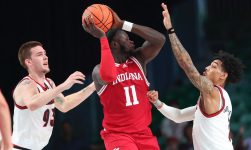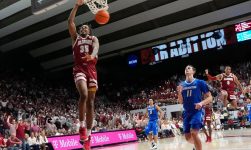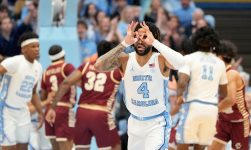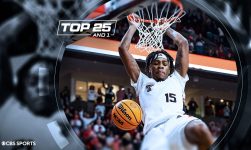Today’s guest columnists are Ohio University professor B. David Ridpath and sports lawyer Mit Winter.
College athletics is currently going through a period of significant change and disruption, with major conference realignment, the transfer portal, athletes being paid for the use of their name, image, and likeness, NCAA transformation, and multiple efforts to declare college athletes as employees. These are just some of the issues facing college athletics leaders and college athletics as a whole. But change is not always a bad thing. Every institution must evolve if it wishes to remain relevant, and college sports is no different. And evolution often does not happen without disruption.
More from Sportico.com
While the current and potential disruption (and the accompanying expansion of college athlete rights) is seen by some as going too far, it is important to remember that, specifically with regard to transfer freedom and NIL rights, these are rights mainstream college students have always had as a matter of course. College athletes should never have been an exception.
Although athletes are entitled to these rights, most industries function more efficiently when there are rules agreed to by the parties involved. To date, college athletics has not operated in this manner. Instead, the NCAA and its member schools have historically created rules relating to athlete compensation and movement, and unilaterally imposed those rules on the athletes.
This approach has two major flaws.
First, and perhaps most problematic, college athletes have had no say in rules that directly affect their experience. They play no part in creating regulations that relate to their health and safety, such as practice limits and restrictions, concussion protocols, and mandated offseason dead periods. They aren’t involved in rule-making that limits their compensation, from third parties or their schools. And they aren’t at the table when standards are set that govern their academic experience.
Story continues
Second, because the athletes do not play a role in the creation of the NCAA’s rules, it leaves those rules (especially the ones relating to athlete compensation and player movement) subject to a series of never-ending antitrust lawsuits. This drains financial and human resources that could be better used to support college athletes in myriad ways.
So what is the solution to remedy these flaws?
One way is for college athletes to be classified as employees of their schools, conferences and/or the NCAA. This would allow athletes to form unions (whether by team, sport or conference) and to collectively bargain for the rules that govern their college athletics experience. This would allow some additional order to be brought to transfer rules, NIL and other compensation rights, as well as health and safety standards, without fear of those rules being subject to continuing antitrust challenges, as they are now. Why is this? Because rules that are collectively bargained are immune from antitrust scrutiny.
For example, rules on when and how often college athletes can transfer, and limits on types of NIL deals, could be negotiated and agreed upon—rather than unilaterally imposed on athletes as they are now.
However, for many, declaring athletes to be employees seems to be a bridge too far. Many in college athletics want it both ways. They want the ability to enact additional restrictions on player movement and athlete compensation, and want those restrictions to be immune from antitrust scrutiny, but they don’t want college athletes to become employees.
This can be seen in the NCAA’s continued push for a federal NIL law. Part of the motivation for a federal law is the hope that the law will include a limited antitrust exemption for NIL restrictions enacted by the NCAA. But the chances for passage of such a law are slim to none. Given the NCAA’s and other college athletics leaders’ stance on college athletes as employees, it might seem that the current state of constant litigation is the only way forward in recalibrating college athletics while also preserving the inherent rights of the athlete.
There is a better option that can be undertaken now, even without college athletes first being deemed employees: direct negotiation with a group or groups representing the interests of college athletes.
Negotiated rules and restrictions between athlete representatives and the NCAA (or another governing entity such as a conference) will eliminate the constant litigation. Instead of letting courts continue to run college sports, it is time for college sports to govern itself.
As noted above, a traditional labor union is not the only type of bargaining structure available to college athletes in negotiating with governing entities. There are countless advocacy associations in sports that attempt to ensure their constituents and members are treated fairly and within the boundaries of the law. Coaches’ associations such as the National Football Coaches Association (NFCA) and the National Association of Basketball Coaches (NABC) lobby and advocate for their NCAA members. Athletic directors and others in the college sports industry have similar advocacy groups.
To date, there has not been an entity with extensive college athlete participation and membership that has been able to successfully negotiate with the NCAA or other college sports entities on the athletes’ behalf. However, there are a number of groups attempting to solve this problem. The National Collegiate Players Association (NCPA) has been in existence for nearly 20 years and has been behind some of the most important, recent changes in college athlete rights, including ensconcing NIL rights in state law. Newer organizations, such as the College Football Players Association and the College Basketball Players Association, have formed to advocate and negotiate on behalf of athletes in those sports. If any of these organizations are successful in generating wide athlete participation, the NCAA and conferences would be wise to explore negotiations with them to bring some stability and certainty to college athletics. The time to act is now.
Ridpath is a professor of sports business at Ohio University and a past president of the Drake Group. Winter, a former basketball player at William & Mary, is an attorney at Kennyhertz Perry LLC in Kansas City, where he specializes in collegiate sports matters.
Click here to read the full article.






